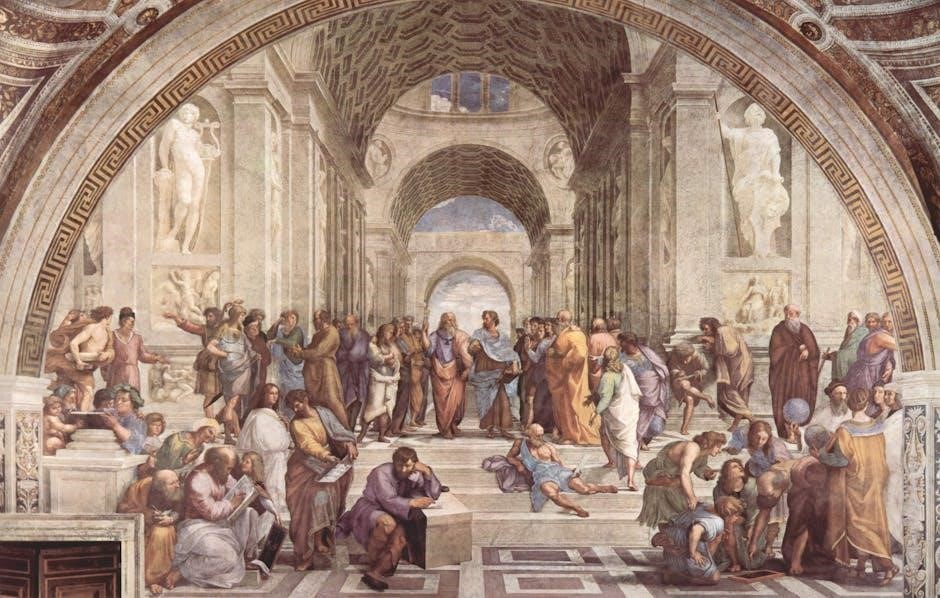dialogues of plato pdf
Availability of Plato’s Dialogues in PDF Format
Plato’s dialogues are widely accessible in PDF format. These digital versions offer a convenient way to explore his philosophical works. Many translations are available, providing access to a variety of readers. This availability makes the dialogues accessible for research and personal study.
Sources for Free PDF Downloads
Free PDF downloads of Plato’s dialogues are available from various sources. Project Gutenberg offers a collection of texts, including Benjamin Jowett’s translations. The Socratic Method Research Portal compiles dialogues into a single file. Digital libraries, such as the Digital Library of India, also host PDFs. These sources provide access to scholarly editions and translations. Ukemi Audiobooks presents a series of recordings divided into Early Period , Middle Period, and Late Period. These resources enable readers to access Plato’s works without cost. These PDFs are useful for students, researchers, and anyone interested in philosophy. Online platforms and course materials also provide access.

Benjamin Jowett’s Translations
Benjamin Jowett’s translations are widely available in PDF format. Jowett, a renowned Greek scholar, provides detailed translations of Plato’s dialogues. His work includes scholarly apparatus and marginal comments, enhancing understanding for readers and researchers alike.
Accessibility and Scholarly Apparatus
Benjamin Jowett’s translations of Plato’s dialogues are noted for their accessibility and comprehensive scholarly apparatus. The PDF versions often preserve marginal comments and links to notes. This detailed approach allows for deeper engagement with Plato’s philosophical ideas. The translations are valuable for both casual readers and serious scholars. Jowett’s meticulous approach ensures a clear understanding of the text. His translations are revised and corrected with indexes. This includes subjects, proper names, and aids in navigation. The scholarly additions enhance the reader’s understanding. Jowett’s work provides a rich source of information and insights.
Key Dialogues Included in Collections
Collections of Plato’s dialogues often feature key works. These include Crito, Phaedo, Laches, Lysis, and Ion. These dialogues offer insights into Socrates’ life and thought. They explore themes of justice, virtue, and knowledge.
Examples: Crito, Phaedo, Laches, Lysis, Ion
The dialogues Crito and Phaedo explore Socrates’ final days, focusing on justice and the soul’s immortality. Laches and Lysis examine courage and friendship, respectively. Ion delves into the nature of poetic inspiration. These dialogues showcase Socrates’ method of inquiry and philosophical insights. They are frequently included in collections of Plato’s works. These dialogues are valuable for understanding Socrates. They offer profound insights into ethics, epistemology, and metaphysics. These dialogues offer a lens into the philosophical issues examined in each dialogue. They provide a glimpse into the drama of Socrates’ trial and death.

The Socratic Method Research Portal
The Socratic Method Research Portal compiles dialogues of Plato into a single downloadable file. This portal offers the Benjamin Jowett translations. This provides a comprehensive resource for scholars and students interested in Socratic philosophy and Platonic dialogues.
Compilation and Availability of Dialogues
The Socratic Method Research Portal stands out as a valuable resource, primarily due to its comprehensive compilation of Plato’s dialogues. This platform provides a single, easily accessible PDF file containing numerous works translated by Benjamin Jowett. This compilation simplifies the process of accessing multiple dialogues. It eliminates the need to search for individual texts across different sources. The portal’s commitment to providing these dialogues contributes significantly to the study and exploration of Socratic philosophy. The availability of this resource supports academic research and individual learning by offering a centralized location for Platonic texts.

Content and Structure of PDF Versions
PDF versions of Plato’s dialogues are typically text-based, allowing for easy export into other applications. This format ensures that the text can be readily used for research, quotation, and analysis, without being locked into a specific platform.
Text-Based Format and Exportability
PDF versions of Plato’s dialogues often feature a text-based format, making it easy to copy and paste sections for academic use or personal annotation. This exportability allows readers to integrate passages into research papers, presentations, or personal study notes. The absence of security restrictions on many PDF files facilitates seamless text transfer. Researchers can extract relevant excerpts and incorporate them into various digital platforms, enhancing analytical capabilities. The text-based format promotes accessibility and enables users to manipulate and share the content effectively, thus fostering wider engagement with Plato’s philosophical ideas, which is very necessary when reading the dialogues.
Erich Segal’s introduction provides clarity and context to Plato’s dialogues. His insights clarify the philosophical issues examined. The introduction enhances understanding for modern readers. It reveals Plato’s life and philosophical issues examined in each dialogue.
Clarity and Philosophical Context
Erich Segal’s introductory notes are known for their clarity, making the dialogues accessible to contemporary readers. Segal’s insights illuminate the philosophical context surrounding each dialogue, enhancing comprehension. The introduction provides valuable background information, aiding in understanding the dialogues’ complexities. It bridges the gap between ancient philosophy and modern perspectives. Segal clarifies the key philosophical issues explored in each dialogue, guiding readers through Plato’s ideas. The introduction is designed to make Plato’s profound thoughts more approachable and understandable. This contextualization helps readers grasp the significance of Plato’s contributions. Segal offers a lens through which to appreciate the dialogues’ enduring relevance.
Online Platforms and Course Materials
Online platforms like McGraw Commons facilitate the use of Plato’s dialogues in academic settings. These platforms support collaborative learning and project-based activities. Course blogs and websites often incorporate the dialogues. This is to enhance student engagement and critical thinking.
Use in Academic Settings
Plato’s dialogues are frequently integrated into university and college curricula, particularly in philosophy, political science, and literature courses. Professors utilize the dialogues to introduce students to fundamental philosophical concepts, such as justice, knowledge, and virtue. The accessible PDF format enables easy distribution and annotation of the texts. Students analyze the dialogues’ arguments, characters, and rhetorical strategies. They also explore the historical context and enduring relevance of Plato’s ideas. Furthermore, the dialogues promote critical thinking and encourage intellectual discussions. Assignments often involve writing essays, participating in debates, and presenting research on specific dialogues or themes. The dialogues serve as a cornerstone of philosophical education.
Translations and Prefatory Notes
Many PDF versions include translations by renowned scholars. These often feature prefatory notes. Hamilton’s notes and Cairns’ essays offer context. These additions help understand the philosophical vocabulary. They also provide insights into different interpretations. Such materials enrich the reader’s experience.
Hamilton and Cairns Contributions
The collected dialogues of Plato often include significant contributions from scholars like Hamilton and Cairns, enhancing the reader’s understanding. Hamilton provides prefatory notes to individual dialogues, offering context and specific insights into the themes and arguments presented. Cairns contributes an introductory essay that gives a broad overview of Plato’s philosophy and writings. This essay helps readers navigate the complex ideas within the dialogues. Additionally, a comprehensive index with cross-references aids in understanding the philosophical vocabulary used by different translators. These scholarly additions enrich the reading experience and provide valuable tools for philosophical study and analysis. They help readers to grasp the nuances.
Analysis and Interpretation
Studying Plato’s dialogues involves careful analysis and interpretation. Scholars explore the philosophical use of literary form. They examine arguments, themes, and characters. Understanding historical context enhances comprehension. Diverse interpretations enrich philosophical discourse. This critical approach fosters deeper engagement.
Philosophical Use of Literary Form
Plato masterfully employs literary elements to convey philosophical ideas. The dialogues are not mere transcriptions but carefully crafted narratives. Characters, settings, and dramatic interactions serve to illustrate and challenge philosophical concepts. Socrates, as a central figure, guides discussions through questioning. His method exposes contradictions and stimulates critical thought. The dialogues explore ethical, metaphysical, and epistemological themes. Plato’s use of allegory and symbolism adds layers of meaning. Analyzing these literary techniques reveals deeper philosophical insights. Readers should be mindful of the dramatic structure and character development. This approach enhances understanding of Plato’s philosophical arguments. The literary form serves as a vehicle for philosophical exploration.
Specific Dialogues and Their Themes
Plato’s dialogues, such as Parmenides and Theaetetus, explore complex themes. Parmenides delves into the nature of forms and being. Theaetetus examines the definition of knowledge. These dialogues offer profound insights into metaphysics and epistemology, making them central to Plato’s philosophy.
Examples: Parmenides, Theaetetus
The dialogues Parmenides and Theaetetus represent Plato’s deep dives into abstract philosophical concepts. Parmenides critically examines the theory of Forms. It presents a dialogue where Socrates faces challenges to his own metaphysical views. Theaetetus rigorously investigates the nature of knowledge. This dialogue explores various definitions and encountering logical difficulties. Both dialogues showcase Plato’s engagement with fundamental questions about reality and understanding. These dialogues are essential for understanding Plato’s philosophical development. Their themes have influenced Western thought for centuries. They are important for scholars and students interested in epistemology and metaphysics. They are rich in arguments and critical analysis.

Accessibility and Public Domain Status
Plato’s dialogues are widely accessible due to their public domain status. Resources like Project Gutenberg offer free PDFs. This allows anyone to read and share these classical works. Public domain status ensures broad availability.
Project Gutenberg Collection
The Project Gutenberg Collection provides free access to numerous Plato dialogues in PDF format. These versions often feature the Benjamin Jowett translations, compiled by the Socratic Method Research Portal. These PDFs are available at no cost and with minimal restrictions, making them widely accessible to anyone. This compilation allows users to use the texts in a variety of ways. The dialogues are suitable for studying. This accessibility helps promote education. The texts are available for scholars. This collection is an invaluable resource.
